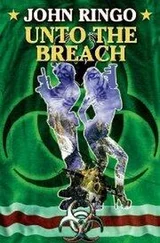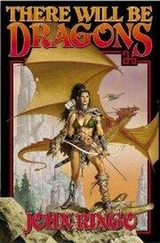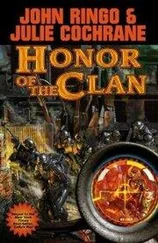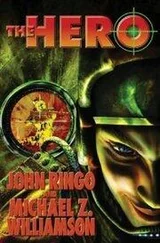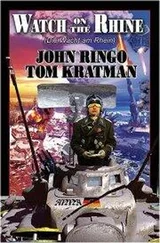Since the opinions of the “press” have tallied with my own assessments of battle and other war-relevant situations only zero point nine-two percent of the time during the one hundred and three years since my original commissioning, I remain baffled as to why most humans continue listening to them. It is, perhaps, something that only another human can understand.
A second group, composed of civilians and uniformed military officers, also waits to meet my Commander. Some of the people on the periphery are busy speaking with reporters, but most are talking excitedly and pointing toward my warhull.
Simon releases the restraints on his command chair. “ I’d better get dirtside. Looks like we’ve got quite a reception committee and most of those folks look pretty nervous.”
“Civilians always are, when they see me.”
Simon pauses beside the ladder leading out of my Command Compartment, resting one hand lightly against the bulkhead. “I know, Sonny,” he says, using my new nickname. “You deserve better. Maybe they’ll get used to you, eventually.”
I refrain from sharing the thought that Renny never did. Neither did most of the other civilians I have known. I am warmed by the gesture, however, for it was meant affectionately, a welcome change from the grim silence into which Simon lapses all too often. I have known six other commanders since my initial commissioning and my relationship with all six was satisfactory, but there is something special about Simon Khrustinov, something that I cannot quite define. I am abruptly very glad that he will be the human to share my last mission — and that I am the Bolo to share his.
As my Commander drops from the end of the long ladder and splashes into the muddy soil beside my treads, a man with a long, thin frame and a long, lean face to match steps forward in greeting. “Major Khrustinov?” he holds out one hand. “I’m Abe Lendan.”
As press cameras record their handshake, my Commander blinks in genuine surprise. “It’s a distinct honor to meet you, Mr. President.”
I, too, feel surprise. This is Abraham Lendan, president of Jefferson? Clearly, Jefferson’s president does not insist upon the same pomp and ritual other planetary heads of state generally demand as their just due. President Lendan introduces the men and women of the official delegation with him. “Major Khrustinov, this is Elora Willoughby, my chief of staff, Ron McArdle, my attache for military affairs, and Julie Alvison, energy advisor. This is Representative Billingsgate, Speaker for the House of Law. Senator Hassan, President of the Senate. And Kadhi Hajamb, High Justice of Jefferson.”
Hands are duly shaken and polite phrases exchanged; then he introduces several ranking officers in the drab green uniform of Jefferson’s home defense force. Their dull uniforms create a sharp contrast with Simon’s brightly colored dress crimsons. Dinochrome Brigade officers do not need to worry about camouflage on the battlefield, since they ride to war inside a hull designed to withstand small nuclear blasts. Among other things, it makes for a stirring and colorful display on the parade ground. It also — and more importantly — serves as a morale boost for officers, technicians, and beleaguered civilian populations.
I pay close attention to these introductions, for these are the men and women with whom my Commander and I will work most closely, planning and carrying out Jefferson’s defense. President Lendan introduces first a man surprisingly elderly for an active military officer. “General Dwight Hightower, our Chief of Defense and Commandant of Combined Ops.” The general’s hair is entirely white and his face bears the lines of many years, perhaps as many as seventy-five or eighty of them. The president turns, then, to the rest of the officers. “Lieutenant General Jasper Shatrevar, Commander of Ground Defense Forces. Admiral Kimani of the Home-Star Navy and General Gustavson, Air Defense Force. And this,” the tall, lean president of Jefferson turns to me, “is Unit SOL-0045?”
A glow is born in Simon’s shadowed eyes. “Indeed it is, Mr. President.”
I am startled that President Lendan has made it his business to learn my official designation, as well as my Commander’s name. Most politicians I have encountered simply refer to me as “the Bolo” and don’t bother to include me directly in conversations.
“How should I address him, Major?” the president asks uncertainly. “Surely his full designation is too long to use all the time?”
“He’ll answer to Sonny.”
Surprise rearranges the worry lines in Abe Lendan’s long face. Then he nods, as the oblique reference to humanity’s home star registers in an expression even I can read. He clears his throat and addresses me directly, peering toward the nearest of my external visual sensors.
“Sonny, welcome to Jefferson.”
“It is my pleasure to be here, Mr. President.”
Several of the onlookers start at the sound of my voice, although I am always careful to use a volume setting low enough not to damage delicate human hearing. Jefferson’s president, however, merely smiles, suggesting a rock-solid core of inner strength that he — and all Jeffersonians — will need. I also note deep lines and dark, bruised-looking hollows around his eyes, which suggest worry and sleeplessness, a state confirmed by President Lendan’s next words.
“You can’t know how glad we are that you’re here, both of you. We’ve been worried the Deng would get here ahead of your transport. Sector Command’s been sending messages meant to reassure, but we’ve dealt with the Deng before. And we’ve had refugee ships coming through, a lot of them. It takes a desperate captain and crew to try crossing the Silurian Void, especially in some of the ships we’ve had limping through our star system. Private yachts that weren’t designed for hyper-L hops that long and dangerous. Merchant ships shot to pieces before they made the jump out. Big ore freighters crammed full of terrified people and damned little food or medical supplies. All of ’em hoping the Deng fleet wouldn’t follow if they ran this way, across the Void, not with richer worlds to tempt them along the main trade route.”
Simon blanches at such news. “Good God! There are Concordiat naval captains who’d think twice about crossing the Void.”
A look of deep stress brings moisture to Abe Lendan’s dark eyes. “A lot of those ships had wounded aboard, some of them so critical, they’re still in our hospitals. God only knows how many of the ships that tried the crossing didn’t make it. From what the refugees are saying, there may be upwards of a hundred ships unaccounted for, this side of the Void. They also told us the Deng hit them hard, much harder than they did during the last war.”
I remember the last Deng war, in which I fought as a rookie straight off the assembly line. Captured human populations were routinely kept alive as slave labor to run mining equipment and manufacturing plants, since that is far less expensive than refitting high-tech equipment to Deng-capable specs. This time, the Deng are simply killing everything in their path. Simon and I have been briefed on this. Clearly, Jefferson’s president also knows it.
“We’re not afraid of a hard fight, Major,” Abe Lendan says quietly, “but we don’t have much here that would slow down a modern Heavy-class Yavac. We have several in-system naval cutters that could slow down an orbital bombardment, but nothing to match a Deng battle cruiser.”
Simon nods understanding as the wind rattles past, heralding the imminent arrival of the storm front. “Yes, we’ve been briefed on it. Bad as the Deng are, Mr. President, we’re fortunate to be facing them, instead of the Melconians. And the Silurian Void is one of the best defenses Jefferson has. Sector Command doesn’t expect a large force to be sent against this world, precisely because it’s so dangerous, crossing the Void. If the Deng do send a detatchment this way, it probably won’t be their first-rate equipment, which they won’t want to risk losing on such a gamble. Sonny should be more than enough to handle whatever they throw our way. He’s had a lot of combat experience.”
Читать дальше


